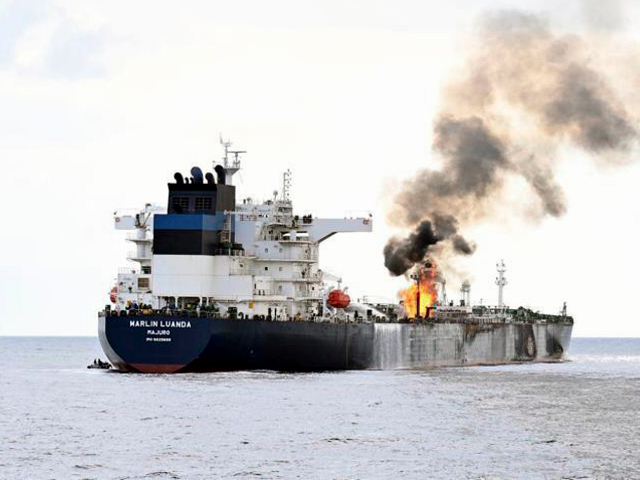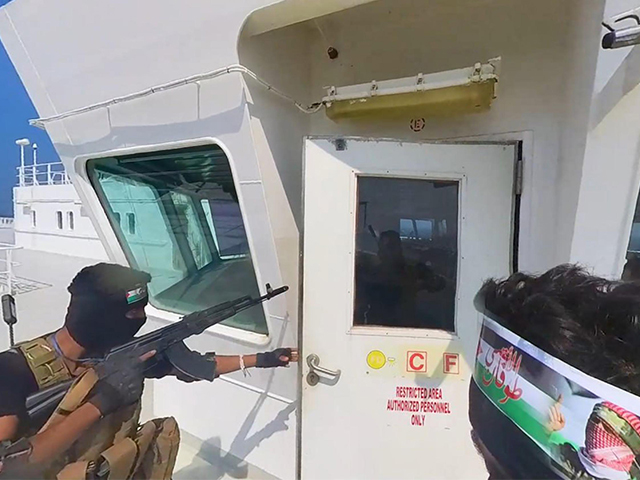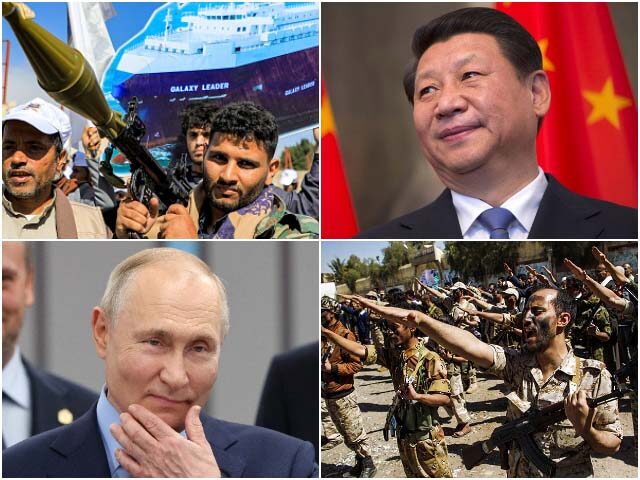Representatives from China and Russia reportedly met with a top Houthi official named Mohammed Abdel Salam in Oman this week to hammer out a safe-passage agreement that will protect Chinese and Russian vessels in the Red Sea.
The Houthis said in January they would not attack Russian or Chinese vessels, but a lower-ranking Houthi official informally made the promise.
The Houthi terror campaign was supposedly focused on ships registered to Israel or its close allies — such as the United States and the United Kingdom — but the Yemeni insurgents have attacked numerous vessels that did not meet those conditions. At least one Houthi missile attack is known to have imperiled a shipment of Russian oil.

A view of the oil tanker Marlin Luanda on fire after an attack in the Gulf of Aden on January 27, 2024. (Indian Navy via AP)
“Several people with knowledge of the militant group’s discussions” told Bloomberg News on Thursday that Chinese and Russian diplomats in Oman worked out a formal agreement for safe passage with Salam.
In exchange for guaranteed safe passage, the Chinese and Russians evidently promised “political support for the Houthis in bodies such as the United Nations Security Council.” The most obvious support Beijing and Moscow could offer would be using their veto powers to block U.N. resolutions against the Houthis, a service their primary patrons in Iran cannot provide.
U.S. Central Command (CENTCOM) Chief Gen. Michael Kurilla told the House Armed Services Committee on Thursday that China and Russia are already supporting the Houthis and receiving safe passage in exchange.
“Russia and China have a bye on any movement through the Red Sea. So what you’re seeing is Iran is using its proxy to allow access for Russia and China to go through the Red Sea while blocking access to others,” he said.
Kurilla said China’s safe passage was, in part, a reward for continuing to buy Iranian oil through “dark fleets” of sanctions-evading oil tankers, which illegally shut off their identification and tracking systems so they could perform clandestine cargo transfers at sea. He said Iran has invested its profits from these oil sales in developing the drones it sells to Russia for use against Ukraine.
“China is interested in purchasing some Iranian UAVs as well,” he pointed out.
Kurilla added that Russia could be preparing to give more advanced military technology to Iran, but he said U.S. intelligence on the matter is classified.
Houthi missile and drone attacks have continued despite the Biden administration’s promises to protect Red Sea shipping. On Tuesday, the Houthis claimed to have struck a U.S. oil tanker in the Red Sea with multiple missiles.
The Pentagon said on Thursday that the Houthis had conducted at least 50 attacks on ships off the coast of Yemen since November.

Yemen’s Houthi fighters take over the Galaxy Leader Cargo on the Red Sea coast off Hudaydah on November 20, 2023. (Houthi Movement via Getty Images)

COMMENTS
Please let us know if you're having issues with commenting.